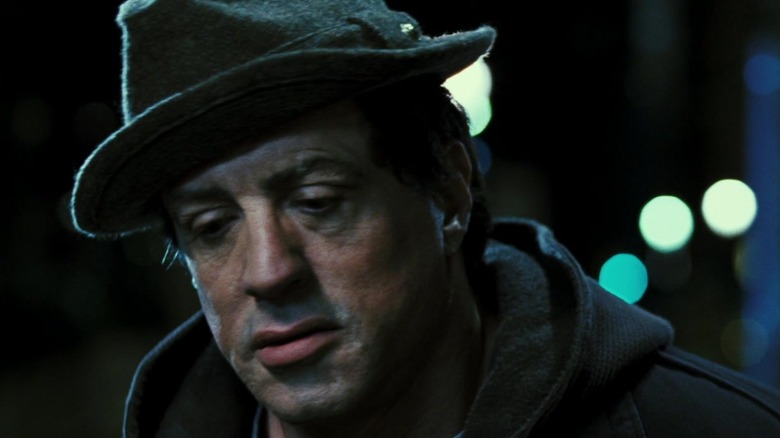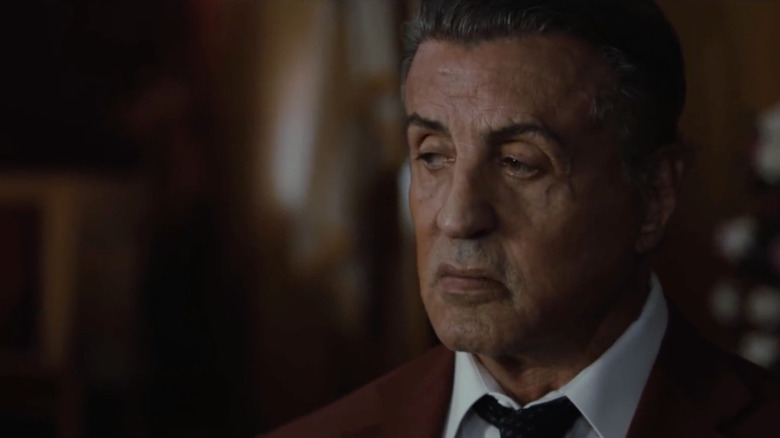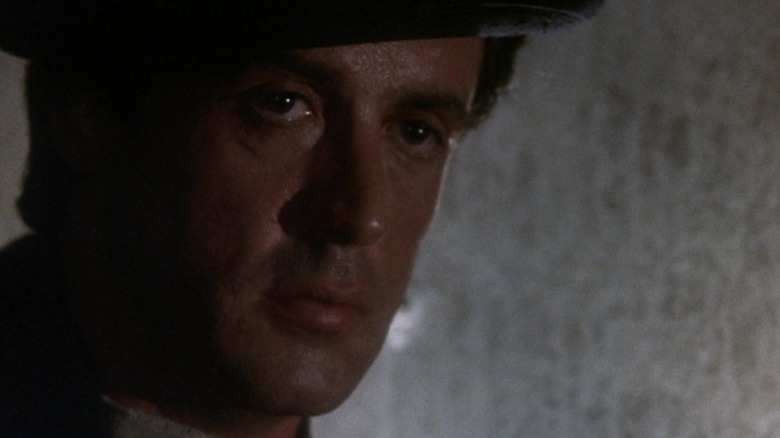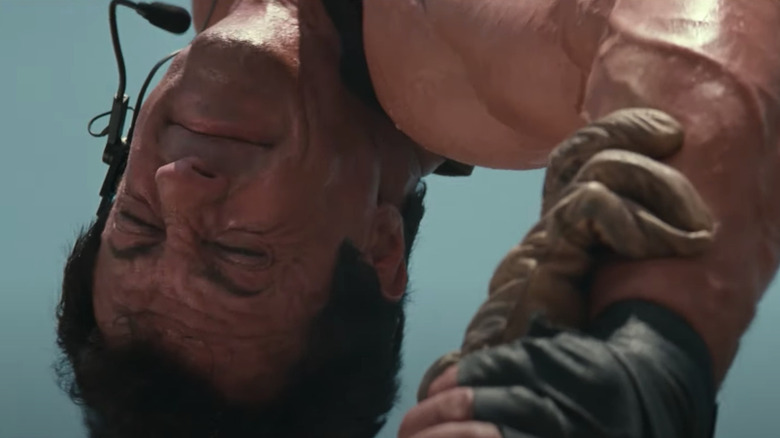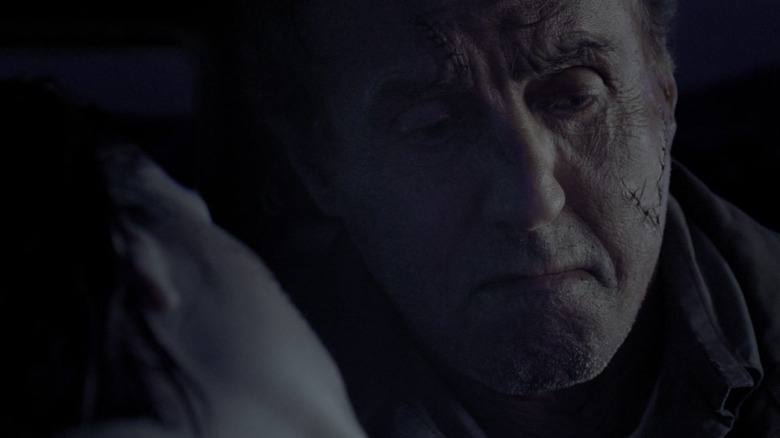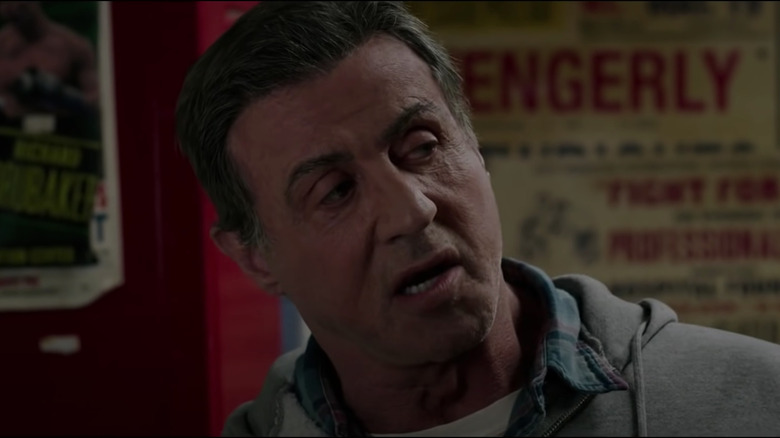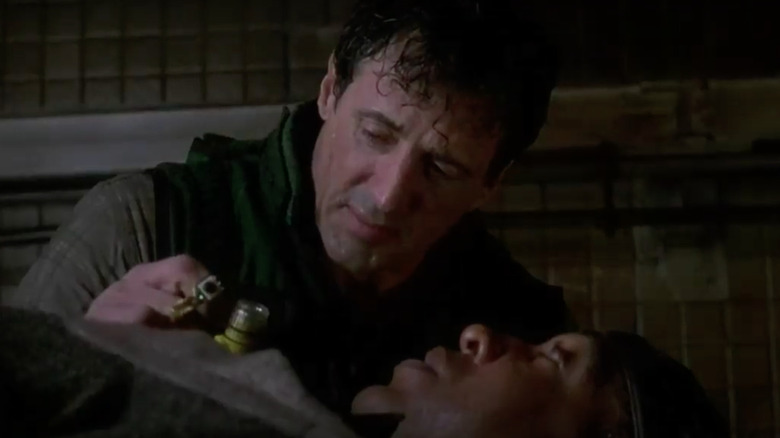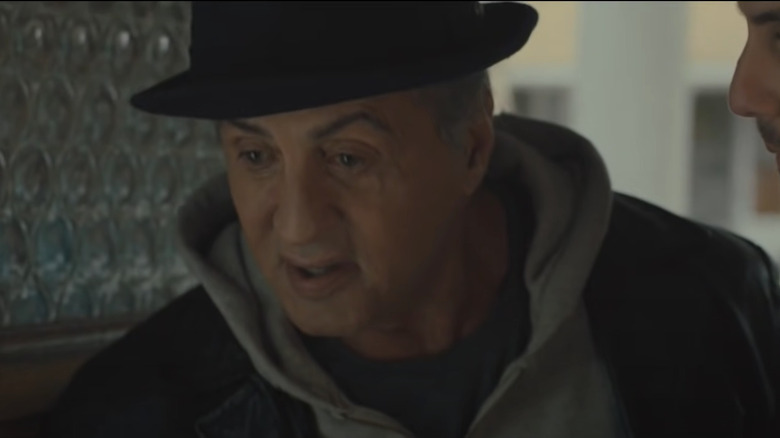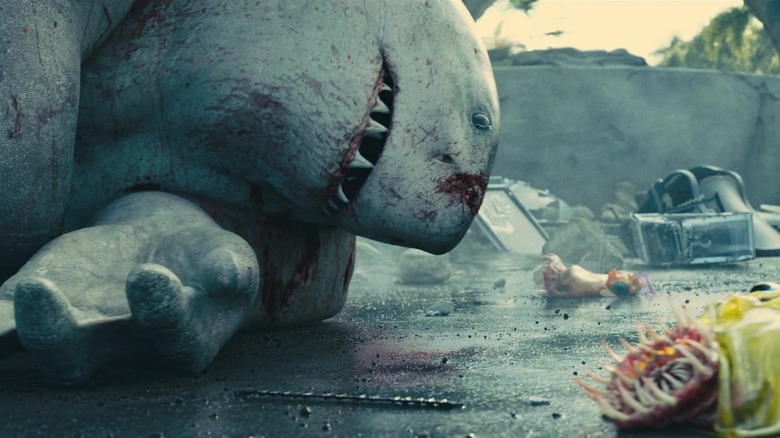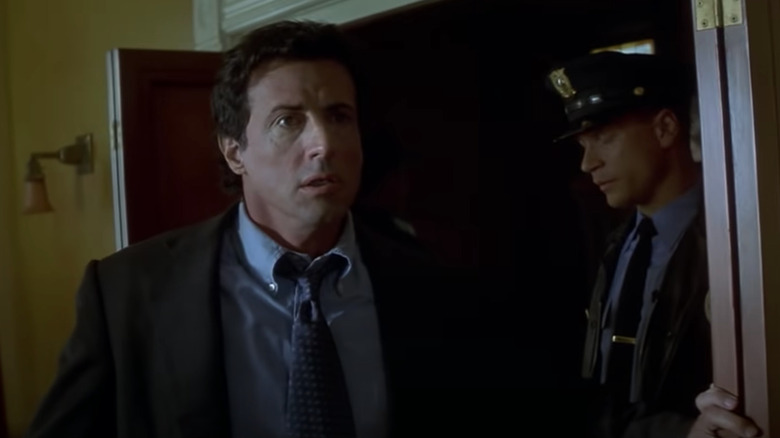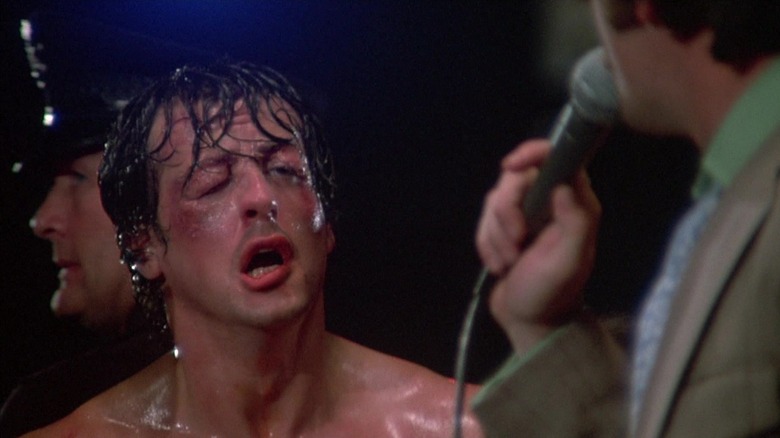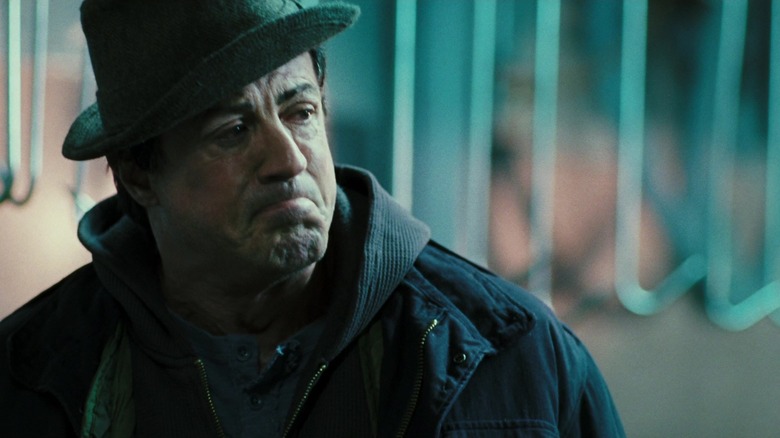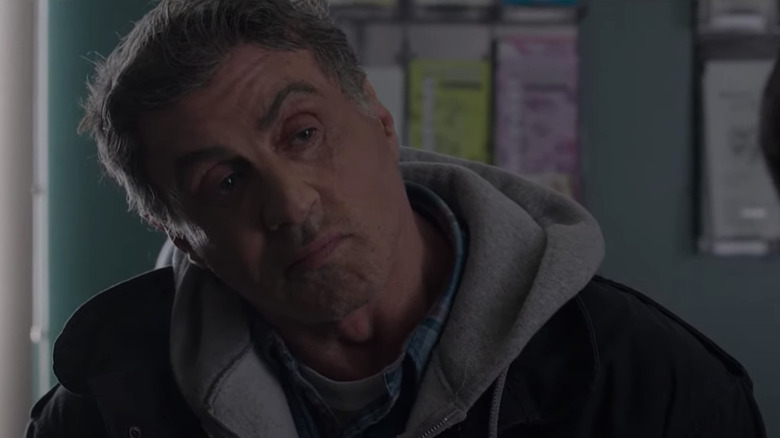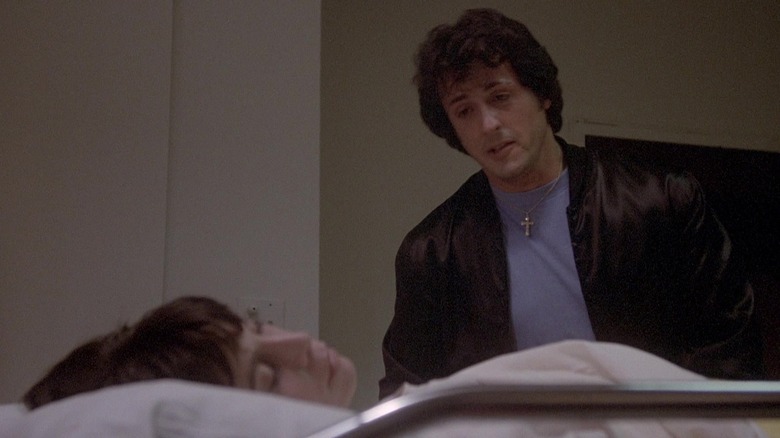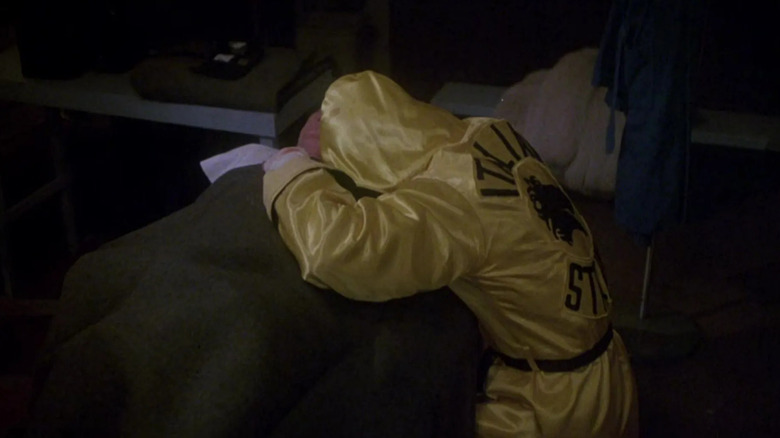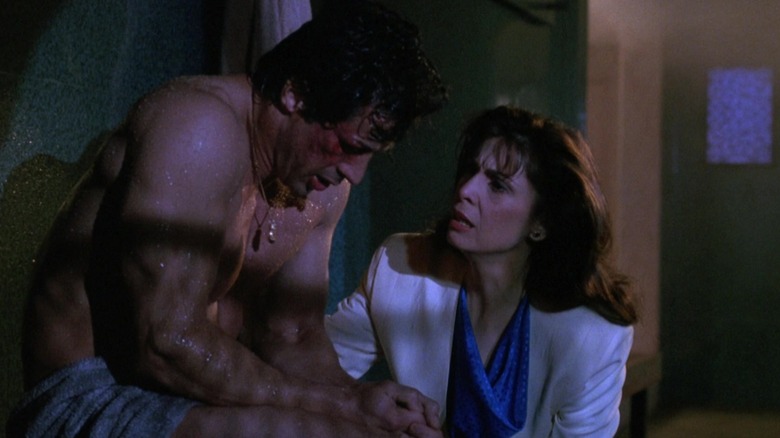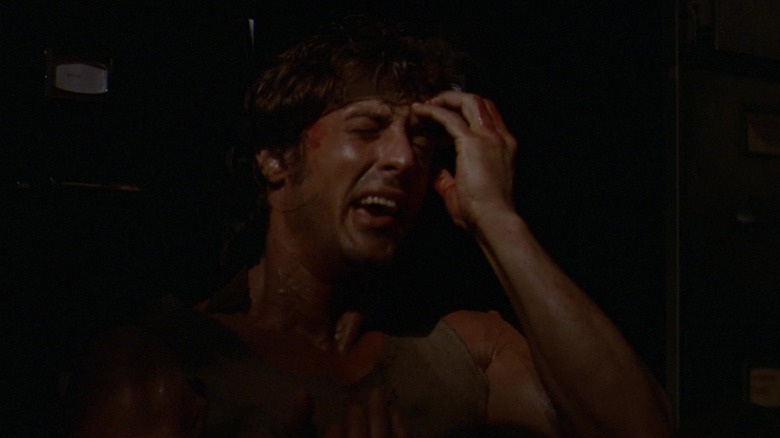Every Time Sylvester Stallone Cried On Camera, Ranked
Never afraid to shed some tears for the sake of a story, Sylvester Stallone has been making audiences reach for the tissues ever since his breakthrough 1976 performance in Best Picture winner "Rocky." Most people don't remember he was also Oscar-nominated for writing that film, perhaps because he would later become a poster child for '80s muscle-bound action vapidity, but those skills speak to why he remains an underrated performer to this day. But Stallone's ability to harness emotional dialogue and deliver vulnerable performances, has always set him far apart from contemporaries with last names like Schwarzenegger, Seagal and Van Damme.
His career has endured for decades — surviving career-threatening bombs like "Judge Dredd" and "Stop! or My Mom Will Shoot" that could have ended the careers of lesser talents — and is still going strong with recent appearances in the "Guardians of the Galaxy" series and an Oscar nomination for acting in "Creed" (as well as a Golden Globe win) in 2015. His continued allure can be attributed to a blue collar, everyman charm and an ability to be more than meets the eye. Beneath that tough, intimidating exterior, his contentment with sensitivity exudes both confidence and courage. There's something heartrending about seeing the brawny guy break down, and Stallone considers that a valuable implement in his acting toolbox.
Like him or not, there's no denying that Sylvester Stallone has a gift for tapping into his sensitive side, perhaps better than any other musclebound star in Hollywood history. Here's a look at every time Stallone has cried on camera — ranked by significance to the story and effectiveness.
16. Rocky eulogizes Spider Rico
We first met Spider Rico in the original "Rocky" film from 1976. He was a local, Philadelphian boxer that competed in an amateur fight with the main character. The match earned them a combined $64.
Spider pops up a couple more times throughout the "Rocky" franchise, but we're told he has passed away in the eighth installment, "Creed II." The movie itself tells a story of the legacies fathers leave behind for their families. It follows the sons of former U.S. heavyweight champion Apollo Creed and Russian Olympic gold medalist Ivan Drago as they go toe-to-toe for more than just a title. It's a fight for pride and glory.
In a deleted scene (hey it counts, it's on camera and we can watch it), Rocky attends Spider's funeral. A glassy-eyed Stallone delivers a sobering monologue about friendship and trauma to a very small turnout. During the eulogy, Rocky reflects on how unfair life was to Spider. He says, "wherever you're going has got to be better than where you've been." Stallone's choked up performance projects an abundance of wisdom, also offering powerful insight into what Rocky's life could have been like if Apollo Creed had never given him a shot at the title.
15. Rocky remembers training with Mickey
Rocky and his family are forced to go back to their roots in "Rocky V." He revamps his old trainer's gym and takes on a protégé of his own. The former heavyweight champ works to rediscover his purpose but is torn between his family, health, and career. The adversity piles up on a man who knows hardship like the back of his hand.
When Rocky first returns to Philadelphia, he stops by Mighty Mick's, the gym that had belonged to his old trainer. Finding it abandoned and dilapidated, he strolls through — reflecting on the impact Mickey (Burgess Meredith) had on both his career and life. In a flashback to a time before the Apollo fight, Mickey lectures him on the importance of motivation, accepting loss, and the meaning of life. Mickey confesses that working with Rocky is what's kept him going in life. "I'll never leave you," he says.
Stallone reminds audiences of why they connect with the lovable lug through his performance in this scene. He remains stone-faced, but his expression shows how good-natured he can be. You can see the pain behind his eyes; a single tear, falling as his character is inspired to get back in the game and overcome his misfortune.
14. Sarah slips away
Sylvester Stallone co-wrote the thriller "Cliffhanger," which premiered in 1993 and acted as something of a career comeback after back-to-back stumbles with "Stop! Or My Mom Will Shoot" and "Oscar." Following an accident in the Rocky Mountains, a ranger named Gabe Walker quits climbing for good. Nearly a year later, he finds himself called upon to rescue a group of stranded people. It all begins with a thrilling action sequence staged by director Renny Harlin, thousands of feet above the ground.
In an instantly-iconic moment memorably parodied by Jim Carrey in "Ace Ventura: When Nature Calls," Stallone's character Walker attempts to rescue his friend, Sarah (Michelle Joyner), who has been stranded on a dangerous peak high up in the Rockies. What starts as a lighthearted scene quickly becomes very tense. Right before the inevitable accident occurs, Sarah asks Walker, "we're still on for dinner tonight, right?"
As she makes her way across a wide canyon, her harness breaks — leaving the woman hanging on for dear life. Walker scrambles out to save her, but he simply can't hang on. She slips from his grasp and falls to her death in front of distraught boyfriend Hal (Michael Rooker). Stallone delivers a look of pure anguish — teeth clenched, tears falling — as he hangs upside down in the air. The hurt that he conveys in this scene sells the entire movie, solidifying the emotions of his character and the journey he faces as the movie treks onward.
13. Gabrielle doesn't make it
Just when John Rambo thought he'd found some peace and quiet, he's pulled back into a life of violence in "Rambo: Last Blood." The fifth installment of the "Rambo" franchise was co-written by Stallone and brought the fight to the title character's doorstep.
The film depicts Rambo living in his father's old house with his friend Maria (Adriana Barraza) and her granddaughter Gabriela (Yvette Monreal). When Gabriela is kidnapped, Rambo embarks on a mission to rescue her — leaving piles of bodies in his wake.
Gabriela becomes a victim of human trafficking when she runs away to find her biological father in Mexico. After Rambo's first attempt to get her back, a barbarous cartel abuses and drugs her as retaliation. Eventually, the pair break free and make it over the border. Rambo races home, but Gabriela is on the verge of death.
"You got so much life left," he tells her, trying to keep the girl awake. "You've got so many things you got to do."
Before long, she succumbs to her injuries and dies in the passenger seat. Stallone goes from vulnerability to fear to grief in the sequence. He whimpers and asks, "Why not me?" His fists are clenched tight and his head rests against the steering wheel. Gabriela was a symbol of innocence to Rambo — something he never thought he'd see again. When she is taken from him, it unearths bridled rage he'd worked so diligently to suppress. Once again, a well-timed tear from Stallone sells the entire concept of an ensuing film.
12. Adonis confronts Rocky about his diagnosis
"Creed," the seventh installment in the "Rocky" series, harkens back to a plot point from the fourth film: the death of his nemesis-turned-friend Apollo Creed (Carl Weathers). Despite never meeting his father, Apollo's son, Adonis (Michael B. Jordan), is a boxer himself. The story centers around the young fighter and his newfound relationship with Rocky Balboa.
Adonis learns that Rocky has been diagnosed with non-Hodgkin's lymphoma. He encourages the older man to seek treatment — but to no avail. Rocky says he's accepted that the disease will likely kill him. In his mind, virtually everyone he's loved has passed away, and it feels like there's nothing left for him. Rocky doesn't see what the young Creed is to him just yet; Adonis forcing him to have a real conversation about his mortality is what makes the scene so emotional. Balboa feels as though his life is already over because he's lost his wife, his best friend, and his mentor. He chokes up talking about it, because it's most likely the first time Rocky has put these feelings into words.
Stallone's performance here shows how difficult it is for Rocky to say these things out loud. Declaring that he's lost his family is like losing them all over again. Through repressed tears, Stallone reminds the audience of a core component of his iconic character's being: the family he has chosen.
11. Kit leaves George behind
An accident in the Holland Tunnel traps a group of New Yorkers beneath the Hudson River in another film that was a highlight for Stallone, his 1996 Rob Cohen-directed disaster flick "Daylight." Stallone plays former Emergency Medical-Services Chief Kit Latura, who puts his life on the line to save as many survivors as he can. On the New York side of the tunnel, a police officer named George Tyrell (Stan Shaw) is crushed under a truck when the road breaks apart. George helps as much of the team escape as he can, but Latura must leave him behind as they slog onward.
The scene shows off Stallone's underrated ability to truly become the characters he plays on screen. Confronting his own mortality, Officer Tyrell tells Kit that he never had the things he wanted: the fast car, the kids, etc. He says that he finally found the woman he loves, but never got a chance to tell her. It's as if Stallone has never read the lines before, as he truly seems to be taking them in and being rocked to his core. "I just need more time," he says, desperately attempting to save Tyrell's life. The police officer knows it's too late for him, however, and insists Latura move along for the sake of saving the others. The heartbreaking scene is made even more powerful by Stallone's tear-streaked face, as he trudges away to effectively dramatic music by Randy Edelman.
10. Rocky meets his grandson
In "Creed II," Adonis is torn between fighting and family. His fiancée Bianca (Tessa Thompson) gives birth to a baby girl named Amara, and they move to Los Angeles to start a new life. The story follows his struggles to figure out the sort of legacy he wants to leave behind for his child.
The film closes with one of its most moving scenes: Adonis visits his father's grave to reflect upon that fatal fight with Viktor Drago. He brings Amara over and proceeds to "introduce" Apollo to his granddaughter. In an unforgettable parallel sequence, Rocky Balboa travels to Canada in order to reconcile with his son (Milo Ventimiglia). He knocks on his door and a little boy answers. It's Logan, the grandson he has never met. The boy is the spitting image of Adrian (Talia Shire), and Rocky is instantly overcome with memories of his deceased wife.
Stallone holds back explicit emotion, while showing us how difficult it is for the character to keep his composure. His eyes water, his voice breaks, and he lowers his head. There's something about the way he wipes away the tears with a single, big finger that strikes a chord. You can faintly notice a vulnerability behind the tough, weathered exterior. It's as though the wind is knocked out of Stallone, and his performance rounds out a profoundly heartwarming conclusion.
9. Nanaue sheds a tear
Even when he isn't on camera, few are better at making a teary-eyed moment count than Stallone. With James Gunn's 2021 "TSS," Stallone joined Task Force X as a CG shark-man named Nanaue (aka King Shark) with human traits, super strength, and a taste for flesh. Although the character is animated, Stallone's deep, gritty voice gave considerable life and personality to the huggable brute.
Nanaue's immature demeanor and insatiable appetite make him an object of ridicule throughout the story, and he struggles to make friends. Towards the film's climax, however, Nanaue stumbles across a massive tank built within an experimentation facility. A school of aquatic life housed inside appears to be fascinated by the brawny fish, engaging with him behind the glass. Thinking he's found some "new, dumb friends" that understand him, he jumps for joy and plays gleefully.
An explosion in the building then breaks the glass between them, and the little beasts prove themselves to be anything but Nanaue's friends. They start attacking him, and he winds up at the feet of the evil Corto Maltese military. As he is barraged with bullets, a single tear wells up and falls from his cold, dark eye. What makes the moment so tragic is that Stallone's character is crying, not because of his injuries, but due to the culmination of rejection and betrayal cast upon him at a moment of apparent redemption.
8. Agent Malloy arrives at the crime scene
In the 2002 film "Eye See You" (also known by its equally-uninspired shooting title "D-Tox"), FBI Agent Jake Malloy's life is turned upside down by a serial killer. After checking in to a remote recovery clinic for law enforcement officers, Malloy finds that his rehab is a painful rehash of the deadly events that brought him there in the first place.
The movie opens with Stallone's Malloy shopping for an engagement ring at a jewelry store. The audience gets a glimpse of Malloy's relationship with his girlfriend Mary (Dina Meyer), but it doesn't last long. Before he can propose, a deranged murderer attempts to hit Malloy where it hurts: He kills his soon-to-be fiancée. "To kill a man is easy," the man says during a tense phone call. "But kill what he loves, and he dies 1,000 times."
Malloy races home, only to discover Mary hanging in the living room. The crime scene is gruesome. Stallone gasps when he sees the horrifying sight, and his astonishment transforms into agony as he drags his feet toward her body. Stallone makes it look like he has to fight to keep his eyes open. Using his emotive talents, the actor projects his character's grief from this moment straight on through the second act.
7. Rocky goes the distance
Just like his creator, Rocky Balboa was struggling to make ends meet in the mid '70s. Stallone had taken the shot of a lifetime with "Rocky," becoming an unlikely new hero at the box-office and with critics, much like how Rocky's opportunity to fight the arrogant, heavyweight boxing champ Apollo Creed was a dare-to-great moment that saw the Philly boxer rise to the occasion. By the end of the film, however, the endearing relationship between Rocky and timid pet-store worker Adrian had become an equally compelling storyline.
Which is why it became one of cinema's most iconic scenes when Rocky, after going 15 rounds with Apollo, broke down. It felt like the culmination not only of the character's love for Adrian, for this storyline of triumph and tenacity, but also perhaps of Stallone's Sisyphean effort to get this film made and delivered to audiences worldwide.
With reporters in his face and the world at his feet (Creed's technical win feels irrelevant at this point), Rocky cries out repeatedly for Adrian, who fights through a bustling crowd toward the ring. She had been in the locker room — unable to watch Rocky be beaten raw, like the slabs of meat he used to train.
The weight of the scene comes from the magic between Stallone and Shire. Their characters make the film more than just a boxing movie — they ably portrayed two misfits who found love, and the way he yells out for her cements what's really important. He went the distance.
6. Rocky opens up to Paulie
"Rocky Balboa" picks up 16 years after the saga's fifth film. Inspired to get back in the ring, the Italian Stallion is thrust into a match with Mason Dixon (Antonio Tarver), the current — and much younger — heavyweight champion. Both men are pushed to their limits in a story that redeems the "Rocky" franchise.
As Rocky decides to try boxing again, he visits his brother-in-law Paulie (Burt Young). The two enter into a conversation that causes Rocky to become emotional and open up. Paulie is surprised that Rocky wants to get back in the ring at all.
"Balboa" marked the first time audiences had seen Rocky after Adrian's death, so his visit with her brother carried significant emotional heft. "Rocky and Adrian" remains one of cinema's all-time beloved couplings, so Stallone had his work cut out for him. He becomes angered when Paulie suggests that Adrian "left" him, but his anger quickly turns to sadness. "Sometimes it's hard to breathe," he mutters. The lump in Stallone's throat is real, and it's heart-wrenching to watch.
5. Rocky is diagnosed with Lymphoma
"Creed" thrusts an aging Rocky Balboa back into the ring as a trainer. This time, he's mentoring Adonis Creed: son of the late Master of Disaster. He fights a different kind of battle in this story — reflecting both on his own life as a fighter and his complicated relationship with Apollo.
Rocky's also struck with some bad news that helps shape the film: He has cancer, and the only way to beat it is through surgery and chemotherapy. Stallone delivers a loaded performance during the scene in the doctor's office where his character gets the news. You can see the sadness in his face; he quickly looks away. The doctor assumes he's worried for his own life, but his sorrow is coming from somewhere else.
His wife, Adrian, was absolutely everything to him. She passed away after a fight with ovarian cancer nearly 15 years earlier. When he's informed of his own diagnosis, Rocky's selfless first thoughts are clearly of her. He expresses hopelessness when he rejects the doctor's suggestions, saying, "my wife tried that." It's the way Stallone delivers the line that provides all the context. It's moving to watch him struggle to hold back his emotions as he sits with the oncologist. He tries to be the polite-and-humble Rocky audiences have come to know, but you can see how years of suffering have hardened him.
4. Adrian has complications during childbirth
The aftermath of the Creed/Balboa title bout is transformative, and "Rocky II" gives fans of the first film a look at how events transpired for both of its competitors. With his reputation tarnished, Creed works to get Balboa out of retirement and back into the ring for a rematch. The two had promised never to fight again, but the circumstances of their lives bring them back together.
The New Year's Day fight changes everything for Rocky. He becomes a household name and earns lucrative endorsements. This newfound fortune leads to a marriage and a pregnancy soon after. One month before his wife Adrian is due, however, a stressful confrontation sends her into labor. Complications ensue and Adrian winds up in a coma.
Written, directed and starring Stallone, "Rocky II" shows audiences a performance even more vulnerable than in the first film. He displays deep feelings of regret, denial, and desperation as he sits at Adrian's bedside. He blames himself and wants her to get the rest that she needs. "You just sleep as long as you want," he pleads. Rocky blaming himself, and his disinterest with seeing his new baby over a comatose Adrian, speaks volumes about the depth of their relationship. Ultimately, the scene shows that Rocky has always been, and always will be, a man with a big heart and great fortitude.
3. Mickey suffers a heart attack
In "Rocky III," Mickey is worried that The Pride of Philadelphia has lost his appetite — that's why he's been handpicking lesser opponents in the aftermath of the championship match with Creed. The sudden introduction of a rising fighter named Clubber Lang (Mr. T) takes Rocky and his trainer down a road that will change both of their lives forever.
A skirmish in the wings before the bout with Clubber causes Mickey to have a heart attack. Consumed with concern for his mentor, Rocky loses the fight — along with his championship title. A subsequent interaction between Rocky and Mickey crushes the film's audience, as if the fight itself hadn't devastated them enough. Rocky leans over a dying Mickey in the locker room, struggling to explain how it went down in the ring. Mickey eventually succumbs, but it's too soon for Rocky. Losing Mickey is like losing a father.
The audience can feel Stallone's heartbreaking performance. He breaks down, screaming, "We got more to do!" There's so much pain in his voice, and Stallone's work here puts fans of the franchise right there in the room alongside the characters.
2. Something breaks inside Rocky
"Rocky V" picks up right after the divisive fourth film's historic fight between Balboa and Drago. It gives audiences a chance to recall the Italian Stallion's legacy, then takes the fight to the streets. Its opening scene is one of the most haunting of the entire franchise. Audiences were flying high after Drago's defeat, but writer/star Stallone and director John G. Avildsen aimed to flip those feelings upside down.
Trainer Tony "Duke" Evers (Tony Burton) packs their bags and celebrates the big win while Rocky recovers in the shower. The way Stallone calls out to him, "Yo, Tony — get Adrian" is chilling. The mood changes in an instant, and the audience can feel the discomfort that forms in the stomach when something's wrong. Through his unsettling performance, Stallone portrays Rocky as hysterical, but struggling to remain calm. He's usually good at keeping his cool, so his sputtering emphasizes how seriously he's upset. Stallone nearly hyperventilates as he reflects about Mickey, telling Shire's Adrian he thinks he's going to die. "I can't stop my hands from shaking," he stammers. Despite winning the match, the fight has broken things in him that will never be fixed.
1. Rambo recounts the horrors of war
In 1982 "First Blood" introduced audiences to John Rambo, a Vietnam veteran struggling with the horrors of PTSD at a time when many theatergoers were unfamiliar with the concept. Based on David Morrell's 1972 novel of the same name, the film portrays Rambo as a destitute veteran trying to find an old friend in a small town. The story examines the mistreatment of servicemen after the war — an issue Stallone has publicly called attention to, and spotlights the clash between post-traumatic stress disorder and bigotry, as its dark framework kicks off an action franchise that has since endured for nearly four decades.
In this original film, a series of events finds Rambo squaring off against the police force of a small town called Hope, Washington. Holed up in their headquarters in the film's final act, he has waged an all-out war against a company of men unable to accept or understand him. He's moments away from killing the sheriff (Brian Dennehy) when his former commanding officer Colonel Trautman (Richard Crenna) arrives. Feeling like he's trapped in the past, Trautman tries to convince Rambo that the war is over.
Stallone delivers a memorable monologue in this iconic scene, one that recounts the horrors of war and the lasting effects of the catastrophic Vietnam Conflict. He breaks down — explaining how he's unable to hold a job, how the country has turned its back on him. He remembers the friends who died so senselessly in his arms. His gripping performance in this scene is what made Rambo a character worth caring about.
